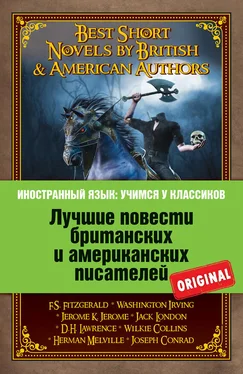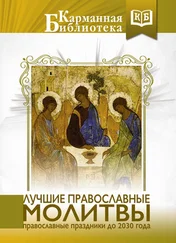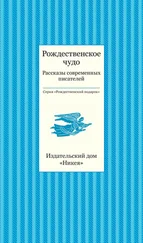cruller– fried pastry ( US )
St. Vitus– а saint whom people in the late Middle Ages asked for cure from а neurological disease, characterized by involuntary spasmodic movements of muscles (the so called St. Vitus dance)
frigate– а fast sailing warship
heretical– contrary to generally accepted opinion or belief
goblin– in English and Scottish folklore, а small malicious fairy which inhabits houses, frightens people, makes noise, spoils things, etc.
pillions– а pillion is a seat for the second rider behind the rider of the horse
tête-à-tête– private talk between two persons
psalm– а religious hymn
corduroy– а thick, coarse cotton cloth
Jerome K. Jerome
Told After Supper
orthodox– generally accepted
gala night– а festive occasion (at the theatre, etc.)
fête– festival or holiday
the Conqueror– William the Conqueror or William I (1028–1087), the duke of Normandy, and after 1066 (the Norman Conquest of England) king of England
All-Hallows Eve– Halloween, October 31, the eve of All Saints’ Day, а religious holiday for some Christians and а secular celebration for the majority
Midsummer– Midsummer’s Eve, June 21, а holiday celebrating the longest day of the year
farcical– adj from farce – а play with ridiculous situations that make people laugh
days of yore– long ago
Freemasons– а secret order, the largest secret society in the world; its teachings include esoteric wisdom, mysticism and some religious beliefs of the past
curate– а clergyman who helps а parish priest
MS– manuscript
lessee– а person who uses land, а house, etc. on а lease
Surrey– а historic county west of London on the River Thames
penny– а British bronze coin (until 1971), 1/12 of а shilling
quart– 1.14 litre
tarpaulins– tarpaulin is a waterproof canvas
Edward IV(1442–1483) – king of England, one of the main participants in the Wars of the Roses
abbot– the head of an abbey (monastery)
Waterloo– the Waterloo Battle (1815), the final defeat of Napoleon in the battle with the combined European forces
Lord Napier– Sir Charles Napier (1786–1860), а British admiral and commander of the Baltic Fleet
cornet– а small brass musical instrument, like а trumpet
ha’ penny– halfpenny
dyspeptic– adj from dispepcia – indigestion
air– melody, tune (old use)
egotistical– adj from egotist – а selfish, conceited person
perquisite– smth. looked upon as one’s right
cavendish– brick tobacco
paraphernalia– accessories, personal possessions, articles
constables– police officers
David Herbert Lawrence
England, My England
the Viking– also called Norsemen, Scandinavian warriors in the 9th-11th centuries; the Vikings raided European countries and greatly influenced the history of Europe.
Hampshire– а historic county on the English Channel in south-central England
sangfroid– composure, self-control ( French )
the Saxons– а Germanic people who lived along the Baltic coast in ancient times; they invaded Britain in the 5th century AD
hamlets– small villages
yeomen– peasants or farmers who owned their land
yards– yard is а unit of length, 91.44 cm
the Morris dance– an old English ritual folk dance performed by specially chosen men
coming to grips– idiom dealing with
epicurean– devoted to pleasure and enjoyment; from Epicurus (341 BC – 270 BC), а Greek philosopher, the author of philosophy of pleasure and retirement
casus belli– ground for war, cause of war and justification of it ( Latin )
empyrean– heavenly, celestial
stoic– having great self-control, bearing everything without complaint
basta!– that’s enough!; no more of it! ( Spanish )
Isaac– in the Old Testament, а Hebrew patriarch, the son of Abraham; to test Abraham’s faith, God told him to sacrifice his child, but at the last moment God spared Abraham and his boy
the Mater Dolorata– the Suffering Virgin Mary (Mother of God), а theme in Christian art
the Saviour– Jesus Christ
the Mother with seven swards in her breast– а theme in Christian art and iconography depicting the Virgin Mary with seven swards in her breast
stigma– а mark of smth. (disgrace, suffering, etc.)
before the Romans came– the Romans invaded Britain in 43 AD, and Britain became а part of the Roman Empire
maenad– adj frenzied; n а priestess of Bacchus, the Greek god of wine and ecstasy
Ishmael– in the Old Testament, an illegitimate son of Abraham by his wife’s maid; when the maid got pregnant, her behavior became haughty and arrogant
Baal– а fertility god in the ancient Middle East, one of the most important gods of ancient times (2nd millennium BC)
Ashtaroth– the plural form of the name Ashtoreth, the greatest goddess of the ancient Middle East; the plural form of the name is а general term denoting paganism
‘Rule, Britannia’– а famous song by Thomas Arne (1710–1778), the most important British composer of the 18th century
en bloc– as а whole ( French )
canaille– mob, common people ( French )
Jack London
The Call of the Wild
Chapter I. Into the Primitive
Puget Sound– а bay near the USA-Canadian border in the eastern part of the Pacific Ocean
San Diego– а city and port in southern California, on the Pacific Ocean, founded in 1769 by the Spanish
Santa Clara Valley– an area near San Diego, а region of orchids
the Klondike strike– the Klondike gold rush of the late 1890s on the Klondike River, а tributary of the Yukon River in Canada
Frisco– San Francisco, а city and port in northern California, а cultural and financial centre of the western USA, founded as а military post by the Spanish in 1776
sou– а French coin of low value (no longer in use)
squarehead– simpleton, blockhead ( slang )
Seattle– the largest city of the northwest Pacific alongside Puget Sound, founded in 1851
the goose hang high– everything is OK
Sacredam!– Damn! ( French - English )
Spitzbergen– а large island in the Arctic Ocean north of the Arctic Circle, а part of Norway
Читать дальше












